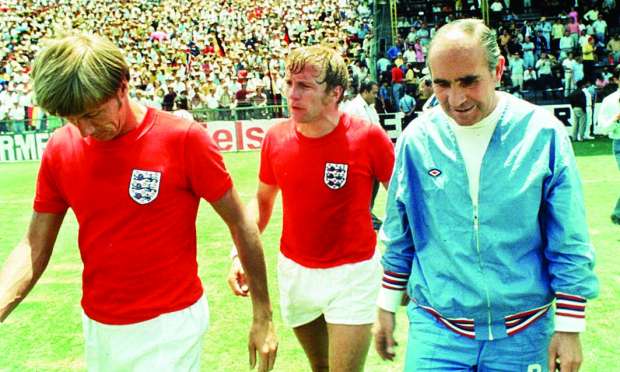
Gary Tedder reflects on the time when the Three Lions consistently missed out on the big events
It started at the end. The end, in the sweltering heat of an unforgiving Mexican afternoon in June 1970, as England surrendered the title of World Champions won four years previously at Wembley, marked the beginning of an absence from the global spotlight of the World Cup Finals which would encompass not only the entire decade ahead but also the first two years of the 80s.
The exhausted, dehydrated and despondent players dragging themselves off the pitch in Leon on that Sunday afternoon, desperate for the shade and sanctuary of the dressing room following their quarter-final exit to West Germany, were unknowingly leaving the world stage for the final time.
Not one member of the England 1970 squad would feature again at a World Cup finals, and most would be in, or approaching, their playing retirement by the time England next qualified. Only Emlyn Hughes, an unused squad member in Mexico, would feature when England next reached the finals of a major tournament – the European Championships in 1980 – when he again failed to appear in any matches.
Even allowing for the disappointing manner of their elimination in Mexico – surrendering what appeared to be a secure two-goal lead – there were few indications that a 12-year exile from football’s main event lay ahead. England were comfortably among the best four sides at the finals, and there was certainly a case for considering them second only to the brilliant Brazilians.
True, the English forwards had struggled for goals during the group stages, netting only twice, compared to eight by Brazil and an impressive ten by West Germany. But their defence was among the most miserly in the competition, conceding just the one – to Brazil’s Jairzinho – in the three group games, and in Gordon Banks they undoubtedly had the world’s finest goalkeeper (in the now- accepted back-story to their quarter-final defeat Banks’ absence through illness is considered to have been a significant factor).
And so, even as the beaten squad flew back across the Atlantic, English supporters were, in the way of fans all over the globe, trying to ease the pain of defeat by not only finding excuses for their team’s failure – playing at altitude, in the full heat of the day to accommodate television’s demands, and on a continent where no European nation had ever lifted the trophy – but also by looking forward with guarded optimism to the European Championships in 1972 and, two years beyond that, to the next World Cup finals in West Germany.
Unfortunately, the expectations of featuring prominently at these tournaments were to end in massive disappointments as England misfired and eventually imploded during the qualifying stages for both.
In 1972 the finals of the European Championships were to be contested by just four nations; playing semi-finals, a third place match and the final itself. To reach the finals countries had been involved throughout 1970 and ’71 in a qualifying stage consisting of eight groups, with the winners of these being drawn against each other in two-legged home and away quarter-finals the following year.
England had negotiated an underwhelming group of Switzerland, Greece and Malta, with just a single point dropped. The quarter-final draw however was far less favourable, pairing them again with their conquerors from Mexico, West Germany. The Germans were already well into the cycle of developing a side for their home World Cup in two years’ time, with a mix of tournament hardened players and exciting youngsters. In addition, they had begun to experiment tactically, with particular emphasis on employing Franz Beckenbauer in the sweeper role.
England, meanwhile, seemed to be treading water. A core of players still remained from the triumph of 1966, all several years older, and, in most cases, with their very best days now behind them. Even talismanic skipper Bobby Moore, after his near perfect performances in Mexico, was struggling. The younger players coming through, while outstanding for their clubs, often struggled at the higher international level, with their technique lagging behind that of their continental counterparts. Manager Sir Alf Ramsey, never considered by the Football Association as anything more than an employee, and now stripped of the protective mantle of being a world champion, started to look an increasingly isolated figure, the pressure building with each disappointing performance.
When the two countries met at Wembley in April ’72, the hosts were embarrassed by West Germany, with midfielder Gunter Netzer brilliantly orchestrating a 3-1 victory. England’s elimination was confirmed two weeks later in West Berlin when the second leg ended goalless.
As the Germans went on to take the trophy later that summer, in England there was a considerable amount of hand-wringing, particularly from an increasingly rabid press, over failure in yet another major international competition. Things, however, were to get far worse!
In October 1972, goalkeeper Banks, probably England’s only remaining world-class player, was involved in a serious car crash which cost him the sight in one eye, and his career. Amid all the personal trauma, a player still at the peak of his game, and with an invaluable wealth of experience, had been lost to the team.
The football universe moved on towards the next tournament. Having been drawn in a World Cup qualifying group with just Poland and Wales, England were expected to progress to the finals in West Germany.
However, the underrated Poles, who had last qualified in 1938, had built a resilient but attractive side around the skilful midfielder Kazimierz Deyna and the attacking brilliance of Robert Gadocha and Grzegorz Lato, and had won football gold at the Munich Olympics in 1972.
England began their campaign against Wales, with an away victory and a disappointing home draw. But their hopes of qualifying were lifted when, in the third match in the group, the Welsh comfortably beat the Poles in Cardiff. Three months later, in June 1973, the England party set off for Poland in good spirits, but these rapidly dissipated when, before in excess of 100,000 fans in Chorzow, they conceded a goal within seven minutes. Despite dominating for lengthy periods, an error by Moore, losing possession in his own half, led to a second for the Poles just after the break, and the match was lost.
With Wales subsequently losing when they visited Chorzow, Ramsey and his players knew that only victory in their last match, against Poland at Wembley in October 1973, would see them qualify for the finals. Unfortunately it was not to be. Despite dominating the game for long periods the English forwards failed to convert any of the numerous chances which fell to them, with just an Alan Clarke penalty to show for their efforts in a 1-1 draw.
Dreams of appearing in the finals were over, and, by the end of that season, so too would be the England careers of World Cup winners Moore, Martin Peters and manager Ramsey.
The Football Association appointed the popular Joe Mercer in a temporary role, as they began their deliberations over a new manager. They almost immediately targeted Leeds United’s Don Revie, the most successful English club manager at the time.
Viewed through the wonderfully clear vision of hindsight, Revie was always going to struggle in transferring the practices which underpinned his success at club level to the international arena. Working with a relatively small group of players at Leeds, he had fostered a close, almost family-like environment, albeit a family with a strain of siege mentality, and occasional psychotic leanings.
Dealing with the Leeds players every day and knowing their strengths, weaknesses and little idiosyncrasies had enabled Revie to shape a team which reflected his own footballing philosophy. They were capable of playing with great flair, but there was a cynicism underpinning their game which made them extremely difficult for the neutral to warm to. International team management, with the often lengthy periods between squad get-togethers, and with players regularly exposed to differing footballing cultures at their clubs, would never grant him the time to develop the almost paternal control he had exercised at Leeds.
Revie also brought with him to the England set up meticulous planning in the form of tactical dossiers on the opposition. However, the players took them less than seriously, and over time the files came to be ridiculed by the media.
On the pitch things started well. Drawn in another difficult qualifying group, this time for the 1976 European Championships, with Czechoslovakia, Portugal and Cyprus,
England’s first game under Revie, in October ’74, saw them record a comfortable 3-0 victory over the Czechs. But points were dropped in two draws with the Portuguese, and a defeat in Bratislava in the return with Czechoslovakia meant that England had failed to qualify for a major tournament for the third consecutive time. Even a Wembley victory over the reigning world champions West Germany, sandwiched between the qualifying games in early 1975, and the Czechs going on to lift the European trophy the following year, couldn’t disguise the fact that something was very awry with the national team.
England were now caught in a cycle of failure. The qualifying draw for the next World Cup – to be held in Argentina in 1978 – put them into a group with Italy, Finland and Luxembourg. The Italians had also failed to qualify for the ’76 European Championships, but proved too strong for England in Rome in November of that year, winning 2-0.
By the time the two met again a year later Revie had departed, his tenure – undermined by Wembley defeats to the Netherlands, Wales and Scotland, and an increasingly fractious relationship with the hierarchy at the FA – ending in controversial and chaotic circumstances in July 1977 when he accepted the position of coach to the United Arab Emirates.
The FA now turned to Ron Greenwood of West Ham, initially on a temporary basis, as they considered a number of candidates. Greenwood was a far less controversial figure than Revie, or Brian Clough, who was interviewed for the role in ’77.
With only two qualifying games left, Greenwood’s first task was to try to inspire the team to high-scoring victories, away to Luxembourg, and then against the Italians at Wembley, in the hope of overturning the latter’s superior goal difference. An indifferent performance in a two-goal win in Luxembourg in October left England needing to beat the Italians by four goals in their November meeting. Despite a more impassioned performance, the task proved beyond them and even a 2-0 victory couldn’t take away the bitterness of yet another qualifying failure.
But, at last, a measure of good fortune was to come England’s way. The finals of the 1980 European Championships in Italy had been expanded to eight nations, and England’s qualifying group, containing the two Irelands, Bulgaria and Denmark, looked eminently winnable.
Greenwood, who had been confirmed as the permanent manager in December ’77, didn’t have to confront the pressure of preparing for the World Cup in Argentina, and therefore had the opportunity to look at his players in less stressful environments. In the six games played in the latter half of the 77-78 season, they suffered just the one defeat, to world champions West Germany in Munich. When the qualifying matches started the following season England got off to something of a flyer.
Denmark were beaten by the odd goal in seven in Copenhagen, and Northern Ireland spanked 4-0 at Wembley, with, sandwiched between them, a draw in Dublin against the Republic the only point they were to drop in comfortably winning the group. At the fifth time of asking, England had managed to once again qualify for the finals of major competition.
But in a dull, uninspiring tournament, England were eliminated at the end of the group stage after beating Spain, losing to hosts Italy and drawing with surprise package Belgium, who topped the group and automatically qualified for the final, where they were beaten by West Germany.
Greenwood had little time to deal with the generally disappointing performances of his team in Italy, as almost immediately England were faced with the qualification stages for the 1982 World Cup in Spain. This was to produce an extremely erratic set of performances by Greenwood’s men, who would only reach the finals as a result of qualification being guaranteed to the top two sides in their group.
Only two points were gained in matches away from Wembley – a 3-1 victory over the eventual group winners Hungary – while hugely dispiriting defeats were endured in Romania, Switzerland and Norway. England’s fate was decided in the final group game where a solitary Paul Mariner goal secured a win, again over Hungary, which lifted them into second place and, at last, earned them a long awaited spot at a World Cup finals.
In Spain, drawn in a group with France, Czechoslovakia and Kuwait, England began in stunning style in the bright sunshine of Bilbao against a French team led by Michel Platini, with Bryan Robson putting them ahead within thirty seconds of the kick-off, as they went on to record a 3-1 win. Subsequent victories over the Czechs and Kuwaitis saw them top the group ahead of France, with both moving into a remodelled second phase of the competition with four further groups, each of three teams. Once again England found themselves confronting West Germany, along with the hosts. Here their inability to break down the most stubborn defences, and the injuries which restricted key players Trevor Brooking and Kevin Keegan to less than 30 minutes playing time each in the whole tournament, produced two goalless stalemates, and England were once again on their way home, undefeated but eliminated.
However, the oppressive fog of failure had been lifted from the collective English shoulders, and although there have been plenty of stumbles, and a few falls, on the qualification roads in the years since 1982, England reached 13 of the 16 finals tournaments since then, and have never again experienced such a lengthy absence as they did during those dark years of the 1970s


















